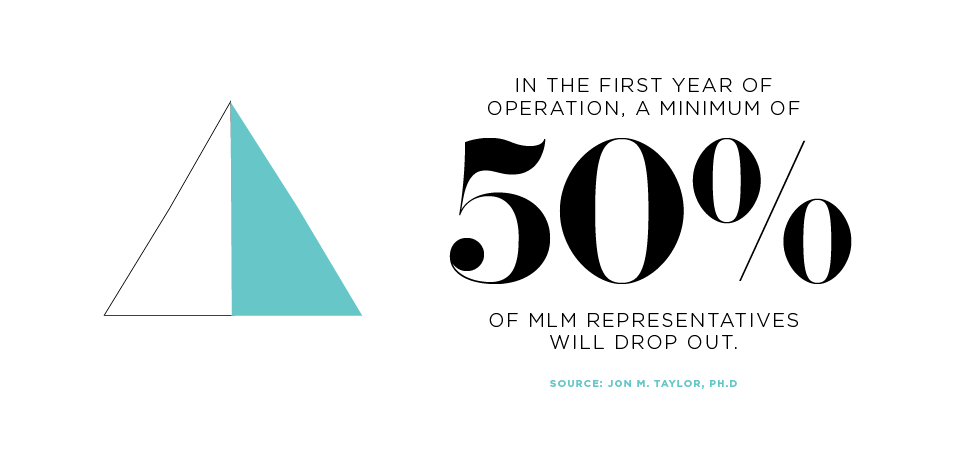MLMs love to sell women a dream of autonomy and financial freedom.
If you’re like me, you’re getting messages from friends, family, and barely-acquaintances (ie. your sister's friend's cousin) selling essential oils, wine, moisturizers, lipstick, body wraps, leggings, handbags, and more.
Before diving into this article, I want to make one thing clear. I direct no judgment towards anyone who has participated, on a representative side, in a multi-level marketing program.
Here at Career Contessa, we have nothing but the utmost respect for women looking to take power into their own hands—whether by starting a business, growing a business, or
participating in side hustles. This is meant to explore what MLMs are, how to identify one, and whether the payoff is worth it.
LuLaRich: The Problem With MLMs is More Than a Legal Issue
When I first listened to the podcast,
The Dream, I realized that MLMs are...everywhere.
After watching
LuLaRich, I realized that the problem is deeper than whether or not a company is legally considered a pyramid scheme. It's a predatory issue.
It's the language they use. It's the promises they make. It's the shame they make people feel when those promises don't come to fruition.
It's how they take from your family, from your life, from your bank account—leaving you to ask, "Am I in a cult?"
What is Multi-Level Marketing?
Multi-level marketing, otherwise known as pyramid selling, is a business model in which a company distributes products through a network of distributors—often known as representatives—who earn income from retail sales and recruitment.
MLMs have always been around. You might recognize names like Tupperware, LuLaRoe, Herbalife, Avon, Mary Kay, and Amway.
It's quite possible that your own mother threw an MLM party while you were crawling around in diapers. It's possible that your grandmother did, too. They have been around forever.
Sounds innocent enough, right? The tricky part is this. Typically, to become a representative for an MLM or pyramid scheme, you need to buy the products outright.
If you are unable to sell the products and expand the business, whether through hosting at-home parties or by recruiting your friends and family on Facebook, you’re out of luck, and you're out of money.
Aside from this initial buy-in, representatives are typically required to buy a certain amount of product on a monthly basis to maintain their status. Partially due to expectations like these, the longevity of an MLM representative is...not that long.
According to
research conducted by Jon M. Taylor, Ph.D., in the first year of operation, a minimum of 50 percent of representatives will drop out. After five years of operation, a minimum of 90 percent of representatives will drop out.
Why Do MLMs Target Women?
Every year, women are driven into deep debt by multi-level marketing companies.
These companies target young women who are looking to make extra money—whether it’s because they aren't employed full-time, because they're looking to pay off some debt, or because they want to make their own money.
Why are people so prone to opt in if loss seems inevitable?
Well, MLMs have relatively low-cost opt-ins for representatives. Because the startup fees of an MLM are much smaller than starting a small business or a franchise, it is easier to invest in and walk away from these "sunk costs."
A "sunk cost" is a cost that has already been incurred and cannot be recovered. It is easier to walk away from $500 dollars lost than it is $20,000 funneled into a small business.
Additionally, MLMs have recently adopted a more “entrepreneurial” language to recruit representatives.
They target stay-at-home moms, military spouses, and other young women to become their own #girlboss or to start their very own “side hustle.” According to
a report by the Federal Trade Commission, 99 percent (99 PERCENT) of representatives
lose money from MLM companies.
Until I was already deep into writing this article, I didn’t recognize my own close call with a multi-level marketing company. I moved to San Francisco in 2011 without a job.
As I scoured Craigslist and LinkedIn for a new job in the marketing field, I found one! Better yet? I was invited for an interview.
When I arrived, I noticed things were awry. There were about 12 other women there, too. We were all corraled into a room where we learned about X Company. “All we had to do” was to buy the starter package of the product.
From there, a deluge of opportunity would follow me. Did it matter that I knew not a soul in San Francisco? Of course not! Did it matter that I am pretty introverted? Not at all.
I was lucky enough not to have a few hundred dollars to “invest in myself” on that day. This anecdote is just another one of the thousands of stories women have—detailing how they lost thousands of dollars to MLMs.
How (and Why) Does Religion Play a Role in Many MLMs?
Religion often plays a role in some MLM businesses. In fact, many of today's most well-known MLMs
come out of Utah—the number one state in the union for multi-level marketing companies.
The other thing that is pretty big in Utah? Mormonism. There are a few reasons that the Church of Jesus Christ of Latter-day Saints and MLMs work so well together. For one thing, the LDS community is incredibly tight-knit.
Connections made within the LDS communities create a trusting network of like-minded individuals. In addition to that, LDS communities include many
missionaries who speak multiple languages. That's a network that knows almost no boundaries.
In addition to the expanse of the religious community itself, LDS culture introduces pressure for women to be stay-at-home moms. In fact, Utah has the
most stay-at-home moms in the entire United States, as 47 percent of married women are "non-employed."
There are other aspects of the Mormon religion that feed directly into multi-level marketing. Mormons view money as a religious blessing.
Multilevel marketing companies know this all too well—and they encourage representatives to seek out more "blessings" and to work hard to make this connection. In addition, Mormons are no strangers to naysayers or implementing door-to-door sales tactics.
The Church of Jesus Christ of Latter-day Saints is not the only religion involved in MLMs, but it is a good case study. When pyramid schemes or MLMs are able to attach their product to an existing theology or faith, they find much more community—and with that, more sales.
Aren’t Pyramid Schemes Illegal?
Pyramid schemes are illegal.
It's really difficult to tell the difference between a legitimate MLM and a pyramid scheme. They are both built on similar business models—models that have "multiple layers" of distributors, representatives, and recruits.
While the FTC keeps a close eye on MLMs and pyramid schemes, it is a 1979 ruling that drew a line in the sand—when the FTC declared that Amway was, in fact, not a pyramid scheme. The main differences the FTC found
between Amway and a traditional "scheme" are as follows:
- Amway does not offer compensation for recruiting new sales representatives.
- Amway's salespeople make money mainly through selling product and managing a team of recruits, for which they get a percentage from each sale.
- Amway does not require that salespeople purchase a costly "starter kit" nor do they impose a monthly order minimum in order to maintain status within the company.
The main difference between a legitimate MLM and a pyramid scheme is the emphasis on the product—and not in the recruitment of new sales representatives.
How Do I Recognize an MLM Scheme?
it can be difficult to differentiate an MLM from a legitimate opportunity. Like we touched on earlier, many MLMs and pyramid schemes adopt "entrepreneurship" language.
We looked through a few "iffy" MLMs and this is the kind of language we found:
- Opportunity
- Showcase yourself
- Be confident
- Empowering
- Ambitious
- Your business
- Your paycheck
- Invest in you
- Empower women
- Support your family
- Reach your dreams
Sounds familiar, right? Aside from the language used, it is very clear that these marketing websites are geared towards women trying to initiate a tide change in their own lives.
They use a combination of flowery fonts, delicate pastels, inspirational testimonials from sellers, and encouraging promises of (almost) instant prosperity.
Honestly, what's not to like?
Everyone wants to pave their own way. It is my belief that MLMs can tend to capitalize on that feeling—and leave a struggling mother deeper in debt than she began.
If you are looking to recognize a shady MLM or a pyramid scheme, do some research. There are many testimonials—both good and bad—on every company out there.
In closing, let me share this with you.
I believe there is no such thing as "getting rich quick." if you want to make extra money,
pay off debt, or
save for the future, you will invariably have to do hard work.
Please steer clear of any company that is promising you a quick fix in exchange for money upfront.













